
by Julia Felton | Jul 17, 2016
In today’s fast paced society the need for teamwork is paramount. We live in an era where the current leadership paradigm is changing. No longer do the command and control structures that typified the industrial era serve us. There is a need for more collaboration and co-operation and the need to establish agile teams that can respond to rapidly changing circumstances that business find itself in.
An incredible 92% of respondents to Deloitte’s Human Capital Survey 2016 noted that organizational culture needs to change and the power of teams is on the rise, but what exactly is a team as opposed to a collective of individuals.
A team is defined as simply as a group of individuals united in pursuit of a common mission or goal, often sacrificing personal agendas for the sake of team accomplishment. It is the fact that the group have a common mission that makes them a team.
In today’s complex world teams enable us to get stuff done. In addition teams also have:
- More fun
- Provide competitive advantage
- Improve productivity and profitability
- Enhance the business identity
Furthermore teamwork builds trust and trust build speed which decreases costs and profitability. In his book The Speed of Trust Stephen M.R. Covey notes that “Trusted companies outperform their competitors by 10x”
Having led and also been a part of many teams during my lifetime I believe that there are 5 essential habits that any team must have to be highly effective and successful.
1) Shared Leadership
Leadership is no longer the bastion of just those at the top and everyone within the team needs to be a leader of sorts. Increasingly, if we look to the natural world teams often contain two leaders who work harmoniously together for the good of the team. Take a herd of wild horses for example. At the front is the lead mare who sets the pace and direction that the herd will take whilst at the rear of the herd is a stallion who drives momentum from behind and matches the pace set by the leader. From this position they can immediately see what is happening and course correct as needed.
2) Clarity of Purpose
Teams work best in a compelling context when they have a shared vision. The more urgent and meaningful the rationale for the team the more likely it is to live up to its performance potential. Team members need to ‘believe in the cause’. If they can’t, they won’t be prepared to sacrifice their own interests in the interests of the team.
This is summed up well by John F. Kennedy who noted that “Effort and courage are not enough without purpose and direction”. You can put the best group of people together but unless they are united behind a shared purpose it is likely that they will just spin around, never achieving their potential or your business goals.
Naturally of course the team goal needs to be aligned to the organisational goal for maximum impact. I remember when I was volunteering at an Elephant Human Relations Aid (EHRA) in Namibia that the purpose of the organisation was to reduce conflict on the ground between elephants and humans. When the group of volunteers went out into the bush our goal was to build strong stone walls around the water wells to protect the water wells from destruction by the elephants and so mitigate any conflict between the locals and the elephants. Our specific goal was to build the stone walls but the reason we were doing it was aligned to the purpose of the company.
3) Open and Honest Conversations
For teams to be effective everyone needs to feel heard and be able to express an opinion. It is this honest dialogue that helps teams achieve more than the sum of the parts. Through honest conversations new ideas are created and innovation ensues. In fact the worst problem in a team is a team member that does not speak with and does not participate because in teamwork, silence isn’t golden; it’s deadly.
One of the reasons for encouraging full participation in the team is that it allows everyone to articulate clearly what outcome they’re seeking. It’s surprising how often team members assume they’re talking about the same thing when in fact they’re talking past one another. For example, if your discussion is about growth some may be referring to revenue, others to market share, and others to net income. Open, honest communication quickly brings these differences to the fore.
When open and honest communication is avoided it encourages team members to join the dots themselves invariably resulting in the wrong conclusion being made. And in my experience open and honest conversations sometimes don’t take place because we are concerned with how the other person will react. We need to become like horses and after we receive feedback go straight back to grazing and stop carrying around any attachment and negativity to what the other person said.
4) Understand Your Strengths and Values
Know yourself and what you bring to the table. Teams work best when everyone is working to their strengths and the team is in flow. There are no egos in an effective team, everyone values the contribution of each other – whatever the size.
An unclear division of responsibilities or a poor understanding of roles makes it impossible for the team to fully exploit its performance capacity. Lack of clarity in this area can lead to communication problems, disputes over matters of competence or responsibility and increased stress. These in turn reduce engagement , productivity and innovation
A great example of this in the African Bush is the Dung beetle. They are often ignored when people go on safari as they are so small and clearly not so impressive as the Big Five. However the dung beetle has an invaluable job in the bush as he cleans up the 50kg of dung that is released every day by the elephants. The dung beetle rolls the dung into a ball, lays his eggs in it and then buries it. Clearly a really important role in the ecosystem of the bush. Just Imagine what would happen if they went on strike!
5) Trustworthiness and Transparency
Great teams are built on trust and it is this that enables the honest conversations to occur and for the team to leverage the strengths of its team members. No group ever becomes a team until it can hold itself accountable as a team. At its core, team accountability is about the sincere promises we make to ourselves and our team mates; promises that underpin the two other critical aspects of effective teams: commitment and trust.
Teams enjoying a strong common purpose and approach inevitably hold themselves responsible, both as individuals and as a team, for the team’s performance. This is essential for high performance, but impossible without high levels of trust.
So are you engaging in these five habits of highly effective teams? Is your team working to its maximum potential? If not spend some time working on these five areas and watch the exponential explosion in performance because the power of teams definitely comes from knowing that 1+1=3.
Julia Felton (aka The Business Wrangler) is the founder of Business HorsePower. Business leaders, entrepreneurs and executives hire her to accelerate their business performance by harnessing the energy of their people to work more collaboratively together. By aligning purpose with actions the team achieves exponential results as everyone starts pulling in the same direction.
Julia believes that business is a force for good and through designing purpose-driven businesses that leverage the laws of nature, and the herd, you can create businesses founded on the principles of connection, collaboration and community that make a significant impact in the world.
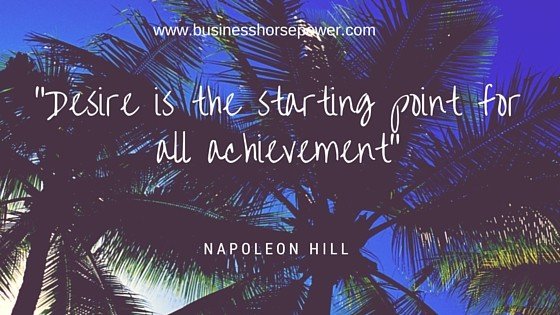
by Julia Felton | Jul 13, 2016
I’ve recently joined a mastermind group where we are studying the work of Napoleon Hill and Think and Grow Rich. If you have never read this book I highly recommend it as it provides some fascinating insights into how to become rich, in whatever format rich means to you.
The research for the book comes from over 500 interviews that Napolean Hill conducted with wealthy and successful people to determine their formula for success. Although the book was originally published in 1937 the principles it rests on are as relevant today as they ever were.
The first chapter is all about desire and how that is the starting point for all achievement and for me my desire is my reason Why I do what I do. Your desire needs to become a consuming obsession, something you would do anything to achieve. It has to be definite and you have to believe that you can accomplish it.
As the book cites: “Wishing will not bring riches. But desiring riches with a state of mind that becomes an obsession, then planning definite ways and means to acquire riches, and backing those plans with persistence, which does not recognize failure, will bring riches.”
What I love above this quote is that it makes the desire actionable by requiring you to create a plan (a strategy) of how you will achieve this and then you need to take consistent action, day in day out to achieve it.
The book then goes on to share a 6 step plan for helping you achieve success:
- Decide exactly what you want to achieve. Be very specific. If it is a financial target then state the exact amount of money
- Decide what you are prepared to give in return for this. (There is no such thing as a free lunch)
- Establish a definite date when you want this to have achieved this
- Create a plan to achieve this desire and immediately get into action, whether you are ready or not.
- Write out a concise statement of what you intend to achieve, by when you will have received it, what you are prepared to exchange in return for it and the plan by which you will achieve this
- Read you statement out loud twice daily – once in the morning and once in the evening. As you read it see, feel and believe that you have already achieved it.
I’d like to invite you to grab a pen right now and do this exercise and then follow it through for the next 40 days, reading every morning and night your statement, and let me know what happens.
I’ll be posting mine in the Facebook group and I’d invite you to do the same. Who knows what you might manifest.
Hope you are having an amazing week.
Julia Felton (aka The Business Wrangler) is the founder of Business HorsePower. Business leaders, entrepreneurs and executives hire her to accelerate their business performance by harnessing the energy of their people to work more collaboratively together. By aligning purpose with actions the team achieves exponential results as everyone starts pulling in the same direction.
Julia believes that business is a force for good and through designing purpose-driven businesses that leverage the laws of nature, and the herd, you can create businesses founded on the principles of connection, collaboration and community that make a significant impact in the world.
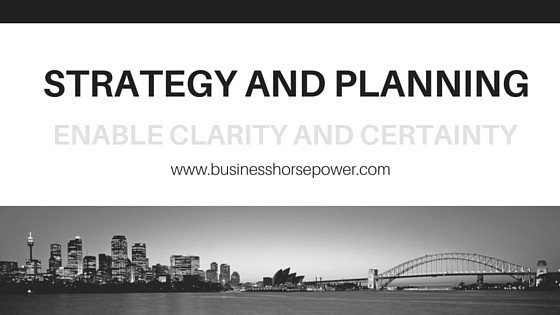
by Julia Felton | Jun 29, 2016
As we reach the mid point of the year, this is a great time to reflect on whether your strategy is working. Have you accomplished all you wanted to during the first six months of the year? If not why not? What do you need to do differently during the next six months to meet your goals?. Do you even have a strategy or any idea of where you are on the journey.
When I start working with many of my clients I often discover they don’t have a strategy in place. They don’t know what success looks like for them and they certainly don’t have a road map of how to get there. Without a strategy and plan in place about what you want to achieve how will you ever know if you are on track and being successful. How will you stay motivated to get going when things get tough?
Personally I experienced the challenge of not having a plan in place this morning and I was shocked about the impact that it had on me. You see I was out doing my morning run and listening to my podcast on when to run and walk. Now for some reason I didn’t hear the piece that told me how long to run for, so when the audio track told me to run I did just that. I started running. The only problem was that I had no frame of reference. I didn’t know if I was running for 8,10, 15 or indeed 20 mins. I can’t explain how challenging I found it not knowing what I was trying to achieve. I was literally running blind, not sure how to conserve my energy as I didn’t know how far I was meant to go. During that run I experienced anxiety and frustration at not just knowing when I would be done.
And as I was running into that blind void I realised that this is the same feeling most business owners have each day. Maybe you can relate to that?. Without a roadmap and strategy you don’t know where you are going. You don’t know when you need to take corrective action, when you need to stop and when you need to push on and get the task completed. You don’t know when to celebrate because you don’t know that ave achieved all you set out to do. Without a strategy and plan you have no clarity and certainty on what is happening.
So if you are feeling off track and need some help getting focus and clarity for the remainder of the year, so that you can regain your confidence in the outcome, then please connect with me for a complimentary mentoring session during which we will identify the current challenges in your business and how you can overcome these. Just book into my diary here. I can’t wait to connect with you.
Have a great week
Julia Felton (aka The Business Wrangler) is the founder of Business HorsePower. Business leaders, entrepreneurs and executives hire her to accelerate their business performance by harnessing the energy of their people to work more collaboratively together. By aligning purpose with actions the team achieves exponential results as everyone starts pulling in the same direction.
Julia believes that business is a force for good and through designing purpose-driven businesses that leverage the laws of nature, and the herd, you can create businesses founded on the principles of connection, collaboration and community that make a significant impact in the world.
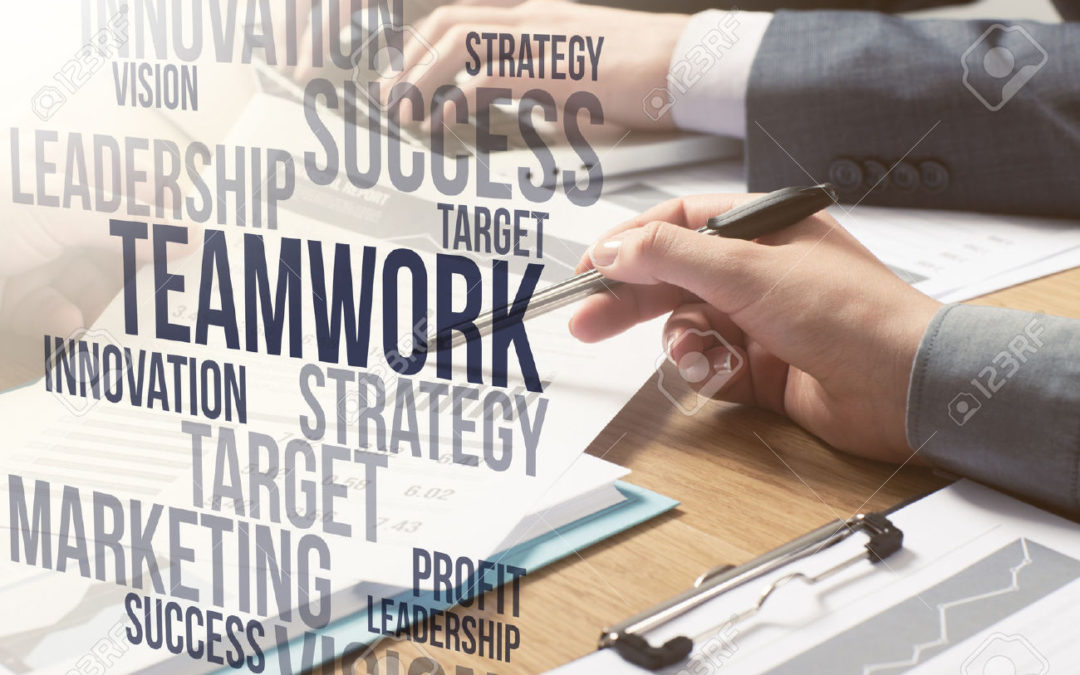
by Julia Felton | Jun 25, 2016
Having led and worked in teams for more than 30 years, I thought I’d share a few key ideas that I have learnt that will you get a team of people to work more cohesively and effectively together. It is particularly effective to do some of these with a new team or group that about to embark on a project together. It can really pay dividends in the smooth running of the project.
1. Enable Them To Build trust
In my book The Alchemy of Change I reveal how trust is the glue that holds a business together. It is that unseen factor in business that makes all the difference. In his book on the five dysfunctions of a team Patrick Lencioni explains i it is really important for a team to develop ‘vulnerability-based’ trust. This means that they need to share things and understand more about each other. Personally I love using Talent Dynamics which is an assessment tool which helps team members learn more about themselves and their other team members in a non-threatening way. And of course when you understand the drivers of your other team members communication can be enhanced. Also by every team member focusing on their strengths the group collective is enable to achieve greater productivity and profitability than the sum of the individuals. This is the power of collective teamwork.
Another way to help team members build trust is by allowing them to share stories with each other about when they were younger. Here is a format that I got from Larry Reynolds, which I have used many times to great effect.
- Think of a time when you faced some kind of challenge. It can be a challenge big or small, and it can be something that happened recently or many years ago. Challenges you faced as a child or young adult can make especially powerful stories. The only proviso is that things worked out alright in the end, and that you are happy to share this experience with others.
- How did you feel when you encountered this challenge? It’s probably something on the spectrum between concerned and terrified.
- What unexpected help came your way? Maybe you drew on some inner resources, or maybe someone else helped you.
- How did things work out in the end?
- What did you learn from this experience?
- What does that say about your values and beliefs as a person now
2. Help Them Get Comfortable With Disagreeing
It’s really important, if a team are to make great decisions that they are comfortable with a level of conflict and disagreement in the team. Give them some tasks to do that involve disagreement and negotiation. Set a task where a decision needs to make and carefully facilitate a discussion where when a person states a point of view or puts forward an idea, at least two people must say specifically what they like or agree with and then at least two people must point out potential issues, flaws or reasons that they disagree. When a team can get comfortable separating the ideas and concepts from the person, they will be able to make better decisions. Also if issues are discussed properly, teams are able to commit to decisions that they don’t necessarily fully agree with if they can understand the rationale behind the decision and they feel that they have been fully heard.
3. Help Them Get Comfortable Giving And Receiving Feedback
Giving and receiving feedback effectively will enable the team to grow and develop faster and will also enable them to hold each other accountable for behaviours and results. Enable them to practise giving real face-to-face feedback by doing an activity such as ‘warm seat’:
A ‘warm seat’ is a little bit like a hot seat but cooler! Group members prepare questions to ask the rest of the group about themselves. These questions can be positive e.g. what is great about working with me? Neutral e.g. what is it like working with me? Or negative e.g. in what ways do I sometimes annoy you? Group members take it in turns to sit in the warm seat for a pre-arranged amount of time e.g. five minutes and ask their questions. Group members answer the questions (which can be general or specific) as specifically as possible with examples. They can only answer questions posed and at any time the person is free to vacate the warm seat if they’ve had enough.
4. Set Up A Team Charter
Another practical thing that a team can do is to set up a team charter, which includes agreements about ways of working. Get clarity first on the team’s vision, purpose and values. Then get clear about people’s different roles within the team by defining individual responsibilities and goals through referencing their strengths using Talent Dynamics. They can then get into identifying appropriate behaviours for team members, communication and decision-making processes and agreements about the use of resources. Encourage the team to put forward ‘rules’ that they can all sign up to, for example, ‘we get back to e-mails from each other within 24 hours’ or ‘when we disagree, we express this calmly and openly’ etc. Once this charter is established, team members can be encouraged to hold each other accountable for both behaving in line with what has been agreed and for their responsibility areas. This should happen as part of every team meeting.
5. Practice Being A Real Team By Giving Them A Challenge To Complete
Overcoming obstacles to achieve a goal is something that we typically get all teams engage in during my leadership with horses workshop. In this exercise the team members set the goal they wish to achieve and then build obstacles that could represent things that could prevent them from meet the goal. They then get introduced to a new team member (a horse) and have to all work together to get over the obstacles and achieve the goals. The team get all kinds of insights into how to communicate effectively, the different positions of leadership and how to co-operate and collaborate together to achieve success. The celebrations that occur when the team is successful are incredible and every team has always gone back to the workplace with more confidence and certainty about their capabilities.
Since the team has had an embodied experience of how to work successfully together this physical or ‘muscle’ memory stays with them and also make them want to achieve that feeling of working in harmony and being jointly accountable again!. Once people feel what it’s like to truly work as a team and achieve positive results, they usually want to do it again!
To learn about how to develop your high performance team please connect with me for a complimentary conversation and lets explore what’s possible.
Julia Felton (aka The Business Wrangler) is the founder of Business HorsePower. Business leaders, entrepreneurs and executives hire her to accelerate their business performance by harnessing the energy of their people to work more collaboratively together. By aligning purpose with actions the team achieves exponential results as everyone starts pulling in the same direction.
Julia believes that business is a force for good and through designing purpose-driven businesses that leverage the laws of nature, and the herd, you can create businesses founded on the principles of connection, collaboration and community that make a significant impact in the world.
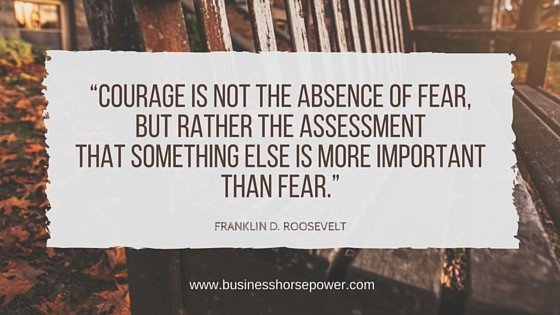
by Julia Felton | Jun 22, 2016
Tomorrow marks a really important day for the future of the UK with the upcoming referendum on Europe. There has been so much said on the subject and I’m not hear to preach to you on how you vote, but rather my message today is please make a decision and take action to vote for whatever party you deem aligns with your values.
So often in life we fail to take action because we are afraid of the consequences. We are afraid of what will happen, how will others react, what will they think. But the one thing I know to be true is that when fear prevents me from taking action I always feel resentful after the fact. I spend ages wondering what would have happened if I had been courageous enough to do what I wanted to do.
And I don’t just mean for the big things in life. Often times when I look back on my life taking courageous action was easier with the bigger decisions in my life. Like going to live in America or moving to Yorkshire. Sure these massive life changing events were scary and I had some fear and anxiety about what I was doing but I was able to rationalize my decision making by saying that I could always move again if I didn’t like the outcome.
However, what I have observed is that it is often the fear associated with smaller decisions in life that really hold me back. For example, the fear that overcomes me when I have to pick up the phone and make a call to a new client. As it is such a simple act I often overlook how failing to take that action could impact my business. And why didn’t I do it. The simple answer is because I was afraid of the outcome – afraid of what the potential client might say, afraid they might not like me. My fear prevented me from being courageous and potentially experiencing a great conversation and enrolling a new client.
The quote above I think so succinctly summarizes how we need to act in life. It’s easy to overcome fear and be courageous when what we are doing is really important to us. When we are doing work aligned with our purpose, although the fear might still exist, our courage to take action is greater and so we in the words of Nike – Just Do It.
So next time you feel fear just step back, review the situation and see how being courageous and taking that action will get you closer to your goal and help you fulfill your purpose.
Julia Felton (aka The Business Wrangler) is the founder of Business HorsePower. Business leaders, entrepreneurs and executives hire her to accelerate their business performance by harnessing the energy of their people to work more collaboratively together. By aligning purpose with actions the team achieves exponential results as everyone starts pulling in the same direction.
Julia believes that business is a force for good and through designing purpose-driven businesses that leverage the laws of nature, and the herd, you can create businesses founded on the principles of connection, collaboration and community that make a significant impact in the world.
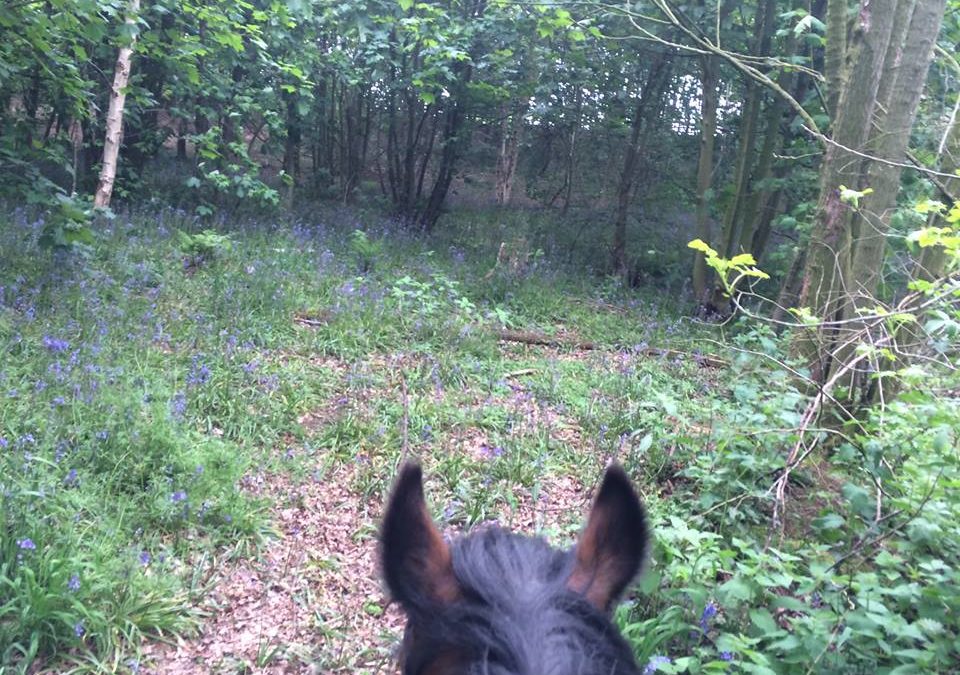
by Julia Felton | Jun 19, 2016
“Judge a man by his questions rather than his answers.” Voltaire
If you don’t know the answer, ask better questions. When we get stuck it is often because we are looking at the challenge through a single lens. We can only see one perspective on the issue and therefore we can’t find the answer. When you learn to ask better questions you are able to open up a raft of other possible options and in time a solution can just magically appear.
I remember a number of years ago using this technique when deciding whether I should keep my horse Charlie. I had him on a three month loan contract and the three months was coming to an end. I just couldn’t decide what to do, as the two options presented to me were that I should buy him or else give him back. I wasn’t happy with either of these options. I was stuck in what decision I should make. I was getting really frustrated.
At the time it didn’t occur to me that there might be some other options. There are always options because I was looking at the situation through my lens – the lens of self. What I had failed to realise was that there were at least two other perspectives. What if I looked at the situation through the lens of Charlie’s owner – the lady I had him on loan from. What would be her thoughts?. Or what would be the observations of a friend or an outsider looking in on the problem. When I looked at my situation through these two different lenses I was able to ask much better questions and so find new solutions.
From the lens of the Charlie’s owner I was able to realise that they really wanted him to have a good home and that was more important than the sale. I also realised that they didn’t really want him back as that would have cost them money. Although they would like to sell him it was infact better for them not to have him back. From the perspective of observer I appreciated that there was a solution that was mutually beneficial to both of us. We could extend the loan term and see what transpired. Extending the decision making process was important to me because at the time Charlie had been suffering from some injuries and I was not sure what the outcome would be. I didn’t want to buy him only to discover that the injuries would not heal, but at the same time he had a big heart and I knew that I could really help him.
This way of looking at challenges and asking better questions is called Positions of Empowerment, and it really helps give a different perspective on all situations. Try it now. Imagine or draw on the floor a triangle. Make the apex the position of the observer. The left hand bottom corner is the perspective of self and the right hand corner the perspective of other. Now literally step into each of these positions and see what questions emerge, and therefore what answers come up.
When I did this exercise about my ownership of Charlie what came up would be that I could ask the owners for an extension to the loan period, That way I could get Charlie through his injuries and then make a sensible decision to buy him based on the outcome. This was never something I had initially considered. Before doing this exercise I had foolishly assumed that the only two options were to buy him or return him. And yet there are always other alternatives if we just stop, ask better questions and then reflect on the outcome to these.
When we ask meaningful questions, we step back so others can step up and think things through for themselves. The art of questioning enables dynamic and critical think-through. Finding relevant questions uncovers and reveals richer, more relevant answers.
One of the challenges is that we have often been brought up not to question things – I know I was – so being curious is a habit that I have had to develop. As the Chines Proverb goes:
“He who asks a question is a fool for five minutes. He who does not ask a question remains a fool forever.”
So here are 10 ways you can stimulate greater appreciation for asking questions:
- Learn to listen actively; don’t just wait to be heard.
- Ask yourself while listening, “What’s trying to happen here?”
- Supportively challenge assumptions without being presumptive.
- Question what’s behind the issue being focused on.
- Gain buy-in during meetings for specific time to explore alternative points of view
- If asking questions appears to irritate, seek to understand the irritation.
- Encourage thinking that isn’t based on assumption.
- Understand how others think and how they approach problem solving.
- Ask, “What questions should we be asking that we’re not asking?”
- Don’t be afraid to appear ignorant?
Now in my case with Charlie I did extend the loan agreement for another six months. Charlie’s injuries did not improve. It turned out he has arthritis in his joints from his racing career and was technically lame on three legs He was never going to be riding horse I had hoped he would. When I learnt this I spoke with the owners and was able to purchase him for the nominal sum of £1, because although he was not rideable I knew he would be an excellent horse for the leadership work I do with horses.
So as a result of asking better questions and getting a different perspective on that situation I was able to save myself a lot of money and heart ache by not having paid full sales price for Charlie and then feeling resentful when he was diagnosed with arthritis. In fact we created a win-win situation where the owners no longer had to care for him and I had a horse that I knew could add amazing value to my leadership programmes.
So what better questions can you ask today? Be curious and you might be really surprised by the results.
Julia Felton (aka The Business Wrangler) is the founder of Business HorsePower. Business leaders, entrepreneurs and executives hire her to accelerate their business performance by harnessing the energy of their people to work more collaboratively together. By aligning purpose with actions the team achieves exponential results as everyone starts pulling in the same direction.
Julia believes that business is a force for good and through designing purpose-driven businesses that leverage the laws of nature, and the herd, you can create businesses founded on the principles of connection, collaboration and community that make a significant impact in the world.
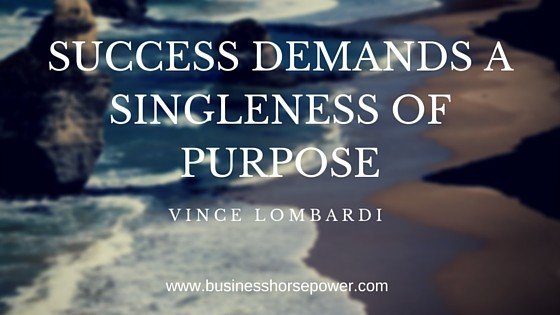
by Julia Felton | Jun 15, 2016
Wednesday Wisdom has come around again and I am delighted to welcome a bunch of new people to the Business HorsePower herd. These are all people that I have had the honour of meetings whilst I have been attending exhibitions, conferences and networking events over the last week. They are all people I have been sharing my purpose and vision for my company with.
So why is it imperative that you have a purpose in business? For me purpose is the rocket fuel that keeps my business going on the days I feel it stalling. It is what keeps me motivated and inspired to do my best. It is what drives the strategy of my business and helps me formulate the decisions I make.
When you are unclear on your purpose and become disconnected from the raison d’etre you went into business then your business can often feel like a rudderless ship, going round and round in circles. You don’t know which path to take because you don’t know where you are going.
After all we live in a world where we have so many choices – arguably way too many – and that is a problem. There is always some bright, new shiny object that you can pursue, some new business venture you can become involved it, some new product you can create. But none of those activities will move your business forwards and help you achieve and sustain success unless they are strategically aligned with where you want to go.
This is why every business needs a routemap (a strategy) of where they are going. Without this clarity who knows where you will end up. So what is a strategy?. It is a plan for obtaining a MAJOR result. It is a plan for enabling you to achieve a quantum leap in your business and it marks the milestones that need to happen to get you there. This is different from a business plan or a load of tactics and to do lists.
Now, if the thought of creating your strategy is bringing you out in a sweat, don’t worry, as I have an agile, innovative solution. Do you think you would be inspired if we could distill your strategy down to just one page – after all if it doesn’t fit on one page its clearly too complicated!. Plus, if you’re like me you will never look at it again.
Creating a single page strategy plan for your business success is a challenging task but one that will reward you 10 times over. It will force you to think differently about your business and prioritize the activities you do, because everything will be linked to your purpose. It will help you focus and stop you getting distracted by what I loving call Entrepreneurial ADD.
So if you a ready to roll your sleeves up and create your strategy on a page then give me a call, and let me help you. This one thing has transformed my business and my life more than anything else I have invested in. It is definitely the one thing that has made all the difference.
I’d love you to let me know if you have a business strategy and if not why not, maybe I can help you.
Wishing you another amazing week.
Julia Felton (aka The Business Wrangler) is the founder of Business HorsePower. Business leaders, entrepreneurs and executives hire her to accelerate their business performance by harnessing the energy of their people to work more collaboratively together. By aligning purpose with actions the team achieves exponential results as everyone starts pulling in the same direction.
Julia believes that business is a force for good and through designing purpose-driven businesses that leverage the laws of nature, and the herd, you can create businesses founded on the principles of connection, collaboration and community that make a significant impact in the world.
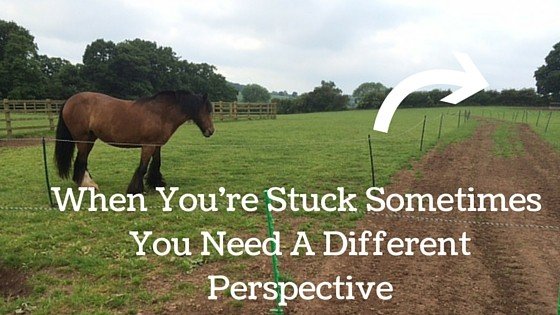
by Julia Felton | Jun 12, 2016
One of the things that I have learnt in business is the value of getting another perspective on a situation. All too often business owners are so stuck in their business and when you are deep in the woods, it is difficult to step back and get an aerial view of what is really going on in your business.
In my book The Alchemy Of Change I likened this situation to being on a ship. When you are stuck under the hatches, below deck you cannot see where you are going and what is coming up on the horizon. Also when you are in this place sometime everything can seem really difficult and yet just one small shift can make all the difference. Jeff Olsen refers to this as the Slight Edge. It is that tiny change that helps everything accelerate to the next level.
This morning my pony Bracken so ably demonstrated this fact that I felt compelled to write about it. You see during the winter the horses field got really wet and so every time the tractor took hay out to the field it left some serious tyre tracks. In some places the ruts were 18 inches deep. So in effect I had a field with these two channels running through the middle of it. Fast forward to last week when finally we were able to roll the field and dig up the tractor ruts and then reseed the field in this area. The result is that there is a strip in the middle of the field which is roped off so the horses can’t walk on it. The challenge is that this means that the horses have to walk around this to get to the gate in order to get out of the field.
So this morning, with a bit of help from me, Charlie, Toby and Thistle figured out they had to follow me up to the top of the field and then walk down to the gate, but bless her, Bracken is all confused. Stuck on the wrong side of the fence she can’t get out. I can see her getting frustrated and annoyed as her friends leave her and yet all she had to do was turn round, walk 100 yards in the other direction and then she could get over to the other side of the seeded grass patch and so join us and come in. But instead of doing this she just stayed there, stuck and getting really frustrated She couldn’t see what was so obvious to everyone else.
So here are the three reasons I learnt from her on why you need a different perspective:
- Stuck in the depth of what was going on Bracken continued to do what she had always done and yet this time she was not getting the results she wanted. She couldn’t get out of the field. And yet in business all too often we can get stuck doing the same thing time and time again and there comes a point where this action is no longer serving us. Bracken needed by different perspective and coaching to show her there was another option.
- Often it is only a minor change that needs to happen to catapult your business to another level. Bracken basically had all the elements in place to get out of the field. She was just approaching the situation in the wrong order. Once she realised that she had to go backwards to go forward then she flew into the new field. And this is also what happens in business. Often we need to take time out to reflect, take stock and re-group before we can move forward.
- Once Bracken had been shown the new way she accelerated with massive momentum towards her goal. And this is what i see happening in business too. Once the business owner has really clarity on where they are going, and is shown a path of how to get there, there business can take off exponentially. Its all about ensuring everything is aligned and then the business will flow effortlessly, much like Bracken when she galloped off to find her friend.
So if you’d like to get a different perspective on where you are in business and how to get to the next level, then please connect with me for a personal strategy consultation where I can help you map out what the problem is and one simple action to can take to get back on track.
Julia Felton (aka The Business Wrangler) is the founder of Business HorsePower. Business leaders, entrepreneurs and executives hire her to accelerate their business performance by harnessing the energy of their people to work more collaboratively together. By aligning purpose with actions the team achieves exponential results as everyone starts pulling in the same direction.
Julia believes that business is a force for good and through designing purpose-driven businesses that leverage the laws of nature, and the herd, you can create businesses founded on the principles of connection, collaboration and community that make a significant impact in the world.
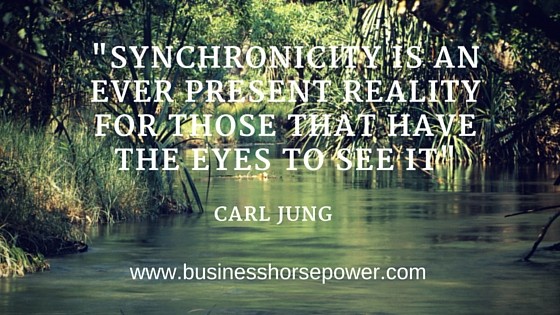
by Julia Felton | Jun 9, 2016
A number of people have recently been asking me why I moved to Yorkshire. After all I could have gone to live anywhere and yet Yorkshire became my calling. I’d love to say I had a concrete plan but that is simply not true. I ended up in Yorkshire because the same person’s name came up four times in a row as a place where I could keep my horses. A place that would resonate with my values and that would provide an amazing base for me to run my leadership workshops with horses. And so I listened, came and checked out the place and the rest as they say is history.
The dictionary defines synchronicity as a series of co-incidences and that is certainly what happened to me. I had always loved Yorkshire from a brief time when I worked up here and then every time I visited my friend Sarah-Jane and her family I loved it even more. So when I had the opportunity to relocate Sarah-Jane suggested Yorkshire and I was open to that.
However, it wasn’t just about moving me. In fact that bit was pretty simple. The more complex piece was finding somewhere for four horses, where they could live out all year, but still have some stabling to come in when they wanted. Plus it had to be a venue that was open to my clients coming along and partnering with the horses to develop their leadership skills. My wish list was long and to some degree potentially unbelievable.
I shared with a number of people what I needed and the same name kept coming up. Initially from an old school friend, who I had not seen in 20 years. When I met her at a reunion she immediately thought I was a horse whisperer and asked me if I knew her friend Sarah. I didn’t directly although it turned out Sarah had assessed my videos when I was studying for my Monty Roberts Certificate in Natural Horsemanship some 5 year earlier. Spooky. And then Sarah’s name came up again a couple of times so I felt compelled to come and meet her. It was Christmas 2012 and of all the yards I went to see Sarah’s yard (which is usually full) was the only one that could accommodate all my four horses and was happy for me to work out of her venue. Plus, as anyone who has been to one of my events will know, it is a magical place and their philosophy of horsemanship so resonates with my own.
The thing is that I would never have found this place if I had not be present and open and really listening to what was going on around me. If I had not listened to my intuition I would not have ended up here. And yet this is the perfect place to be.
And if I stop and reflect on my life there have been loads of these co-incidences. What initially appear random events all aligning to show me the path to my success. The challenge is that often we are so embroiled in our day to day activities that we never stop and see the opportunities right before our eyes.
So today, I urge you to slow down, become present and really see what is happening around you, as there are clues everywhere. You just need to look and then join the dots.
I’d love to hear from you on how synchronicity has shaped your destiny and the biggest lessons you have learned. I truly believe that everything is happening for a reason. It is just up to you to listen and the take action.
Have an amazing synchronistic week.
Julia Felton (aka The Business Wrangler) is the founder of Business HorsePower. Business leaders, entrepreneurs and executives hire her to accelerate their business performance by harnessing the energy of their people to work more collaboratively together. By aligning purpose with actions the team achieves exponential results as everyone starts pulling in the same direction.
Julia believes that business is a force for good and through designing purpose-driven businesses that leverage the laws of nature, and the herd, you can create businesses founded on the principles of connection, collaboration and community that make a significant impact in the world.

by Julia Felton | Jun 1, 2016
Wow, can you believe that today is the 1st June. Where has the year gone. At this time of year I like to take stock of what has occurred and make sure I am on track for the rest of the year. I take time to review what has worked – so I can do more of it – and what hasn’t so that I can refine and amend it. Only by reviewing what has happened are you in a place to make some different decisions about the future course.
And what do you do if you’re not on track? Then I urge you to consider this. Are you simply interested in the goal or are you committed, and I mean really committed to it? I’m interested in losing weight and eating more healthy food but am I committed. If I’m honest no, or else I wouldn’t be eating chocolate bars and take-away meals.
So how do we become committed to something? We ensure that we have motivation for achieving that goal, something that pulls us forward day in and day out. Something that inspires us to get out of bed every day and take action, not because we have to but because we want to.
In my experience I only really get committed to a goal when I have a good reason why I want to do it – a purpose – and that reason is usually something bigger than me. When you can get clear on your purpose then taking action becomes easy because everything is aligned and congruent.
It is as important to have a clear purpose in business as it is in life. Without either you can feel like a rudderless ship that is going round in circles and never getting anywhere. And what a massive waste of time, energy and resources that is.
There are a number of tools that you can use to help get you clear on your purpose but what is imperative is that you write your purpose and goals down. Research by Gayle Matthews from the Dominican University has discovered that writing down your goals increases your chances of success by at least 50%.
This is one of the reasons why Strategy on a Page works so well. It helps you distill onto one page your purpose, values, visions and also the strategic goals and Business Growth Indicators for your business. And by having clarity, focus and accountability clients get incredible results. So if you’re prepared to take action and be committed to your own success, please connect with me and I’ll share how Strategy on a Page could really help you move your business to the next level.
So until next time stay committed to your goals and achieve massive success.
Julia Felton (aka The Business Wrangler) is the founder of Business HorsePower. Business leaders, entrepreneurs and executives hire her to accelerate their business performance by harnessing the energy of their people to work more collaboratively together. By aligning purpose with actions the team achieves exponential results as everyone starts pulling in the same direction.
Julia believes that business is a force for good and through designing purpose-driven businesses that leverage the laws of nature, and the herd, you can create businesses founded on the principles of connection, collaboration and community that make a significant impact in the world.
















